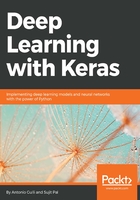
上QQ阅读APP看书,第一时间看更新
The first example of Keras code
The initial building block of Keras is a model, and the simplest model is called sequential. A sequential Keras model is a linear pipeline (a stack) of neural networks layers. This code fragment defines a single layer with 12 artificial neurons, and it expects 8 input variables (also known as features):
from keras.models import Sequential
model = Sequential()
model.add(Dense(12, input_dim=8, kernel_initializer='random_uniform'))
Each neuron can be initialized with specific weights. Keras provides a few choices, the most common of which are listed as follows:
- random_uniform: Weights are initialized to uniformly random small values in (-0.05, 0.05). In other words, any value within the given interval is equally likely to be drawn.
- random_normal: Weights are initialized according to a Gaussian, with a zero mean and small standard deviation of 0.05. For those of you who are not familiar with a Gaussian, think about a symmetric bell curve shape.
- zero: All weights are initialized to zero.
A full list is available at https://keras.io/initializations/.